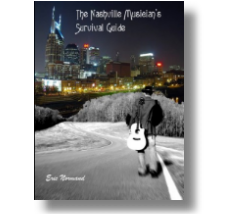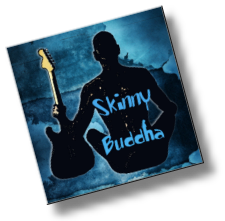
It was a warm Wednesday night in July of 2007 when the Rhett Akins tour left Nashville, Tennessee, bound for Macon, Georgia, on what would be a four city run across the deep South. The bus, a still shiny and new looking 2005 Prevost XLII, wreaked of personality, while the driver, Les, was somewhat reserved and looked a bit less than shiny and new. As is typical in the world of one-off bus leasing, this would be our first and only trip with this driver, and although he seemed to drive okay, we knew almost nothing about him. Well, over the next four days we would 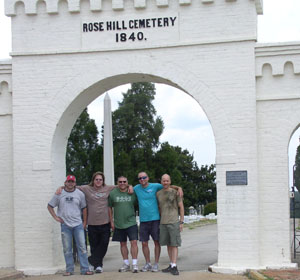 learn everything we needed to know about ‘Mr. personality’.
learn everything we needed to know about ‘Mr. personality’.
The six-hour ride to Macon was uneventful enough, and I didn’t even wake up when we pulled into the Ramada Inn parking lot. The rest of the day went pretty smoothly, and we even managed to fit in a visit to the infamous ‘Rose Hill Cemetary’, the Allman Brothers early stomping ground and eventual resting place of Duane Allman and Berry Oakley. Our show at the Cox Capitol Theatre later that night went well, after which we taxied the bus back to the hotel to sleep over as our next destination, Thomaston, Georgia, was only 50 miles away.
We left Macon at 11:00 AM on Friday morning for the one-hour trip to the small town of Thomaston, Georgia, eventually landing in front of ‘Q’s Downtown Grill and Music Hall’, and had a little down time between our arrival and load-in. Most of us were hanging in the front lounge when Les began his first in a series of rude and inconsiderate commentaries. “I was just offered an $85,000 a year driving job, but I think I’m going to turn it down” he boasted. “Why? That sounds like a great gig” one of us asked. “I usually make a lot more than that. Last year, I made $120,000” he continued in an annoying offhand manner. “What an asshole!” we all thought. We all knew that bus drivers make a ton of money but didn’t need to be reminded just how much more they make then the rest of us.
A short while later we sent Les off to his hotel room for sleep and went about our day. Rightafter load-in the wind picked up outside and it began to pour. Some severe weather had moved in and the power was knocked out for a while. We later learned that a tornado had touchdown a couple of miles away, but fortunately the weather passed, the power came back on, and we continued about our day. We played our show that night to a packed house, loaded out, and enjoyed some late night partying on the bus while we waited for our driver. As luck would have it, the runner was late picking up Les, who apparently had to wait in the hotel lobby for about 45 minutes. So by the time Les arrived back to the bus, he was somewhat agitated and had a hard time concealing this.
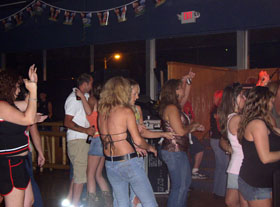 Sometime around 3 AM we began the 7 Hour drive to Augusta, Georgia, although now, the quality of the drive was noticeably rougher. Other than some hard braking at a few points, we assumed that the rough ride was just due to some poor road conditions across that part of the state. By the time we pulled into ‘The Country Club’, the happening nightspot in which we would be performing on this Friday night, a red carpet had been laid out for our arrival. Band and crew quickly attacked a huge platter of chicken fingers, shrimp cocktail, and a veggie plate that had been set out for us in the green room.
Sometime around 3 AM we began the 7 Hour drive to Augusta, Georgia, although now, the quality of the drive was noticeably rougher. Other than some hard braking at a few points, we assumed that the rough ride was just due to some poor road conditions across that part of the state. By the time we pulled into ‘The Country Club’, the happening nightspot in which we would be performing on this Friday night, a red carpet had been laid out for our arrival. Band and crew quickly attacked a huge platter of chicken fingers, shrimp cocktail, and a veggie plate that had been set out for us in the green room.
We sent Les off to his room, loaded in, and sound checked. This was of course followed by dinner, hotel time, and a blistering performance to a packed house of 1000 plus concertgoers and parties. The crowd was overly enthusiastic on this hot summer night and the party spilled out into the parking lot after the show. By the time Les returned around 2 AM the front lounge of the bus was full of nightclub patrons and in full ‘K-tel dance party’ mode. There was also 30 or 40 people hanging out in the parking lot near the bus, and this is where Les delivered his next uncanny remark. “Does Rhett party like this every night?” he said judgingly. “Every night’s different, sometimes we party a little bit, other times we’re tired and go to bed. Why do you care?” I answered, now annoyed with this would-be high school prom chaperone. “It just seems pretty irresponsible to me. Not a good way to run a business.” he grumbled.
About an hour later we set sail for Myrtle Beach, South Carolina, the final stop of this five legged bus ride that was getting rougher every minute. Apparently annoyed by our after show activities,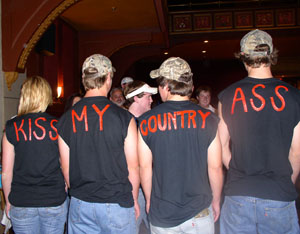 Les tossed us around pretty good for the five hour trip, perhaps as some sort of punishment for having “too much fun”. A lot of side to side sway, hard braking, you know, the kind of bus driver tendencies typical of a moron. We pulled into the parking lot of ‘The Boathouse’ which was the venue we would be playing, and this time I was instantly awoken as the bus jerked to a quick, hard stop. A little while later I sent Les off to his room at the adjacent Holiday Inn, notifying him that we planned to depart for home at 11 PM that night.
Les tossed us around pretty good for the five hour trip, perhaps as some sort of punishment for having “too much fun”. A lot of side to side sway, hard braking, you know, the kind of bus driver tendencies typical of a moron. We pulled into the parking lot of ‘The Boathouse’ which was the venue we would be playing, and this time I was instantly awoken as the bus jerked to a quick, hard stop. A little while later I sent Les off to his room at the adjacent Holiday Inn, notifying him that we planned to depart for home at 11 PM that night.
Saturday proved to be another great outing for Rhett and band, an outdoor summertime concert behind a nightclub on the banks of a river. Again, the day’s activities and concert went quite well, with the biggest drama being delivered by our wing-nut bus driver at the end of the night. Our show had ended at 9:30 and we were all hanging out inside the bar waiting for the 11:00 PM bus call. Around 10 of, I walked out to the bus to see if Les was ready. Upon opening the bus door I was astonished to see him sitting in the driver’s seat smoking a cigarette (In case you’ve never ridden on a tour bus, in general, this is a no-no). Smoking on our busses is only permitted while the bus is in motion, as this will allow the smoke to ventilate out an open window. I asked him to not smoke on the bus while not moving, and he reluctantly extinguished his cigarette.
I told him I would go get the rest of the guys and that we could leave shortly. Upon returning to the bar I quickly realized a couple of the guys must’ve gone over to the hotel, and called them to tell them we were ready to leave. When I returned to the parking lot I was dumbfounded to see the tail lights of our bus growing smaller in the distance as Les was apparently more than ready to be done with us. When I called him on my cell phone and asked “What are you doing?” he sarcastically answered “Are you ready to go yet?”. “Well yeah, I was just rounding up the guys. I told everyone were about to leave, and next thing I know I’ve got guys running after the bus across the parking lot carrying 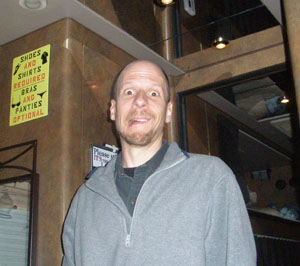 suitcases. What the hell are you doing?” “All right, I’m coming back now.” He said in a cocky tone of voice, almost as if this was some sort of weird game of bus driver/tour manager chicken.
suitcases. What the hell are you doing?” “All right, I’m coming back now.” He said in a cocky tone of voice, almost as if this was some sort of weird game of bus driver/tour manager chicken.
He brought the bus back, we hopped on, and took off down the highway, more than ready to be done with this jack-off. About an hour Into the drive, our drummer, Cliff, informed me that he had left his suitcase back at the hotel. I was horrified. I was already at a breaking point with this driver, and it seemed like he hated driving us. This is the last thing I wanted to do, but I had to do it. “Hey Les, I hate to tell you this, but Cliff left his luggage back at the hotel and we need to go back and get it.” After muttering some sort of offhand comment under his breath, he literally locked up the brakes, sending people flying as bottles fell off the counter and smashed on the floor. Again, I was dumbfounded. “What the hell you doing? He didn’t forget his bag on purpose. We want to be done with this trip just as badly as you do. Do you really think we want to spend an extra two hours on this bus with you?” I unleashed.
“Sorry about that. I didn’t mean to hit the brakes that hard.” he said. I then added “So far on this trip, each night your driving has gotten rougher and rougher. We don’t care about making good time on these trips, we want a smooth ride so we can sleep. Do you think you can lose the attitude just long enough for that to happen?”
With that, he turned around, went back for Cliff’s bag, and then began the 600 mile trip home two hours later, and for the second time. I guess the only satisfaction we got out of this was the knowledge that we made the final leg of the trip two hours longer than necessary for “les the mess’.
I’ve been on a lot of buses, with a lot of different drivers, but this particular trip was a first. Never, and I mean never, have I had a driver just drive a waiting tour bus off into the night without telling somebody. Never have I seen one smoke a cigarette in the driver’s seat while the bus was parked. Never have I had a driver question our organization, or our right to party after the show. But then again, never had I ever experienced the exceptional bus driving skills of ‘Les the wing-nut’.
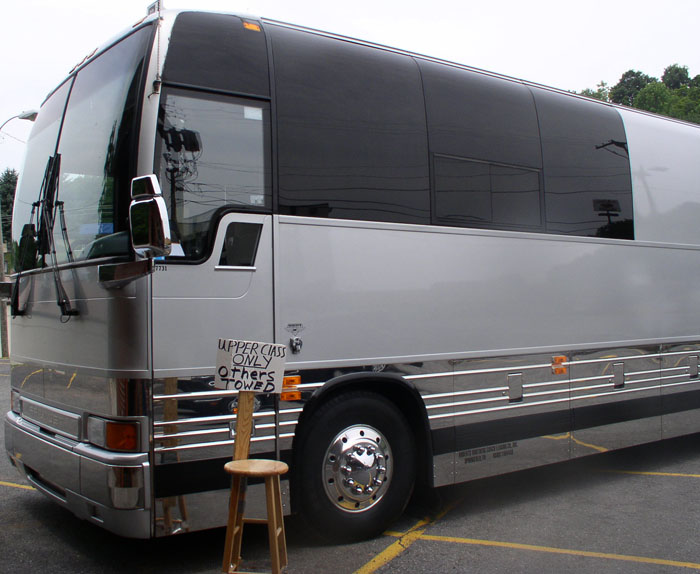
It was almost midnight on a Friday in late September, 2006 when I pulled up to the bus near Opryland in Nashville, TN. The Longbranch saloon in Raleigh, North Carolina would be the destination for Rhett Akins and band, and this ten hour – 540 mile trip would be a one-off. The driver, Ed, was sitting in the driver’s seat when I opened the door to enter the bus, and I immediately noticed a few peculiarities. To the right of his dash-mounted GPS was a little platform upon which sat a laptop, screen open and powered on. On the floor to his right was a large igloo cooler. On his head sat an oversized telephone headset (think AT&T operators of yesteryear) which was wired to a cell phone also mounted on the dash. “Hi, I’m Ed. Pleased to meet you” he said, and with this enthusiastic introduction I thought ‘Okay, I guess I’ll have to give this guy a chance, even though he looks like he’s wired for a moon landing.’
A short while later we were loaded up and headed east on interstate 40, and I went to my bunk to go to sleep. Now anybody that’s done this ride before knows that I40 through eastern Tennessee and North Carolina is a mountainous region, full of steep inclines and hard grades. ‘The gorge’ is one particularly harrowing mountain pass in the middle of this trip that requires some careful navigating, as do a few other spots. It was in these mountain passes where I first realized that Ed was a bit less than great when I awoke in my bunk with my face pressed up against the wall. I could hear the sounds of the diesel engine moaning loudly as he dug in hard up one incline after the next. I eventually fell back asleep but not without a few restless hours of wondering if he was going to drive the bus off of a cliff, as his bouts with the rumble strip occurred at regular intervals. The sway factor was also pretty intense, almost as if he was conducting experiments in weightlessness for NASA. I found out the next day that Cliff Thompson, our drummer, has slammed his head into the bathroom wall as a result of some rough braking during the night, and that a guitar had fallen out of junk bunk. Sometime midmorning I sleepily crawled out of my bunk feeling a bit like a tossed salad.
“Did you sleep well?” Ed unknowingly exclaimed as I entered the now stationary front lounge. “Actually, I didn’t, the ride was kind of rough. I could feel quite a bit of side to side sway in my bunk.” I said in the most neutral tone I could muster. “Yeah, I noticed that a little bit too. Maybe the suspension on this bus needs to be adjusted.” “Maybe you could just drive a little bit slower on the ride home” I requested and he agreed to try. By this point of my touring life I had already been on many bus rides with many different bus drivers, some great, some terrible, and many in between. From my experiences they all think they’re great, I mean let’s face it, nobody thinks they suck. So usually by the time you figure out your driver sucks you’re well into your trip, it’s too late to do anything about it, and criticizing him or her can go either way.
By noon we were loading into the club and I was sending Ed off to his hotel room to get some sleep. “Can you put me on the guest list for tonight?” he asked “I might come back a little early and catch the last part of the show.” “Sure” I answered to this more than typical request. We went about our day, sound checking, hotels, dinner, meet and greet, etc. We hit the stage at 11:00 PM to a packed house and nothing seemed too out of the ordinary until midway through our set when I spotted our driver line dancing with some locals on the dance floor. That was the only time I noticed him in the club during our show, but immediately afterwards our merch person told me that Ed had come up to the merch table with a girl under one arm, and alcohol on his breath. A little while later I was the first tour member onto the bus and was astonished to be greeted by Ed and some unknown floozy. “Great show!” He gleefully exclaimed as they stepped off the otherwise empty bus. Is this guy for real? You would think he was the one on tour.
We loaded our gear, climbed aboard, and settled in for another frightful trip through the gorge. I wasn’t alone in my distaste for this driver, as everyone else had commented throughout the day on the rough ride and his odd behavior. Right before we set out on the voyage home I made one more attempt at coercing a smoother ride from this brainless wonder, but a short while later it was obvious that he just plain sucked. Bobby Dancy, our bass player at the time, also suspected that we were in for another 10 hour hell ride and grabbed the unopened bottle of Crown Royal from the countertop. “This is the only thing that’s going to put me to sleep tonight.” and with that he took a big swig. “I agree. With this clown at the wheel we’re going to have to change the name of the tour to Bob Weaver and the Wanderers” and with that I took a swig. We all but killed off that bottle by four or five in the morning on this would-be roller coaster ride thru hell, at which point we each began slowly retreating to our bunks, wondering if this might be the last bus trip of our lives.
Amazingly, we did eventually pull back into Nashville and the boat-like motion finally came to an end. Aside from a nasty three-day hangover, the only thing that was damaged was Cliffs forehead (from hitting the bathroom wall), and the drivers pride from the ass reaming I unleashed on him just before I drove off. I learned later from Kelly, that at one point Scott had walked to the front of the bus to discover Ed surfing on match.com on his laptop while going 75 down the highway.
I don’t remember the name of the bus company we were using at this point, it was one of several $300 a day companies that disappointed us during this time. There’s no free lunch in this world, if you try to save money with buses, you’ll still pay in the end – whether through stress, lost sleep, breakdowns, whatever. Ultimately, it was a handful of bad experiences like this one that would lead us to the decision to switch to top shelf bus companies. Because if you try to skimp out, the money you save on busses, you will spend on whiskey instead.
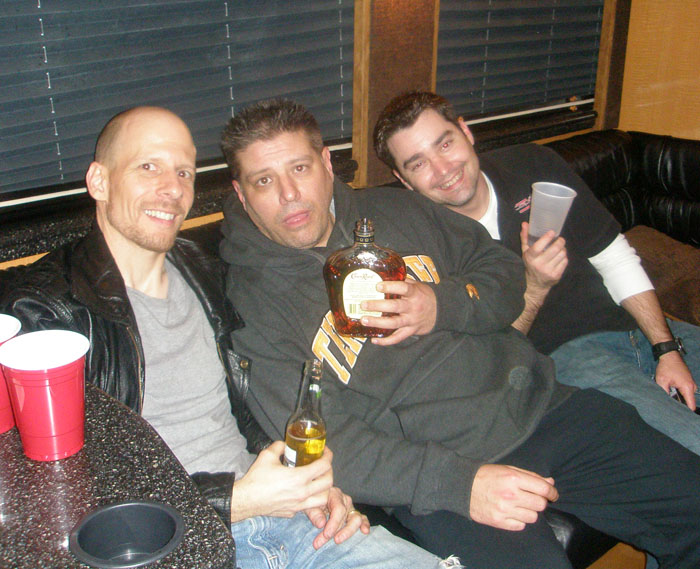
My experiences with a brake happy novice bus driver this past weekend have prompted me to write a few articles on the do’s and don’ts of driving an entertainer coach. This article will be the first of a series I will be writing in the next couple of weeks.
Working for Rhett Akins over the past few years I’ve become a bit spoiled regarding how we travel around the country. We regularly lease top-of-the-line tour busses from Roberts Brothers Coach, one of the best bus companies on the planet, and as most of our activity are weekends runs, it’s usually a different bus each time. Usually this kind of one-off leasing means a different driver each time too, but we’ve been fortunate to wind up with an arrangement that allows us to have the same driver, Steve Pope, for most of these trips. This has turned out to be a best case scenario as he is an exceptional driver, and a great guy too. The downside is that he is so good that most others pale in comparison.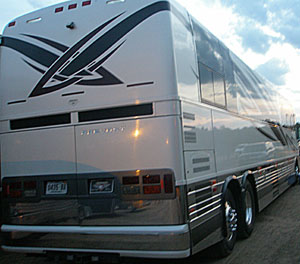
Well on this past weekends’ run, unfortunately as it turned out, Steve had to take the weekend off and we were stuck with a substitute driver. As bad luck would have it, the bus was sub leased through another company as well. So last Friday we set out from Nashville at 11 AM with our ‘mystery driver’ for the weekend. You never know how good or bad a driver will be until you’re down the road a ways, but on this trip it didn’t take long to figure out that this guy wasn’t very good.
We all noticed that he was a bit ‘brake happy’ before we even get out of the city, and by the time we were going 70 mph down I 65 we could feel some excessive side to side sway as well. A short while after our departure, the sounds of country music could be heard loudly in the front lounge, emitting from the driver’s seat stereo. At one point during the drive I asked him if he had been driving buses for very long, and he said “I just recently started driving buses, but before that I drove semi’s for a long time.” I felt like saying ‘I’m not surprised.’ but decided to refrain. I couldn’t help but notice several CD jackets and CDs strewn about the floor by his feet. Perhaps it might have served him well to spend a bit more time focusing on the road rather than his CD collection. By the time we arrived in Troy, Alabama six hours later, I was fairly worn out from the excessive G-force this novice driver delivered.
We arrived at Troy University and the driver pulled the bus over to figure out where our final destination would be, which seemed odd considering I had already given him an itinerary with the venue’s street address and he was using a GPS. When I asked him what street we were on he exclaimed “I don’t know.” It seemed like there just was not a lot going on upstairs with this fellow. So I got my contact at the fraternity on the phone and he guided us in. After the bus had landed, I asked him to level the bus with the air shocks as we were parked on an incline. After a few failed attempts he gave up, either because the leveling function on this bus didn’t work, or the leveling function in his brain didn’t work.
We sent the driver off to a hotel room to sleep and went about our day loading in, sound checking, hotel time, etc. We played our show, loaded out, and waited for our driver to return to embark on leg two of this bounce-athon. Shortly after he returned, we departed for the 430 mile, eight hour ride to Kentucky. After several minutes of ‘testing’ the brakes on the way out of the 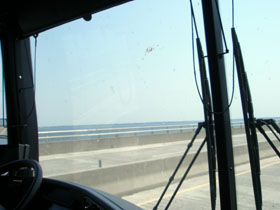 parking lot, we were rolling down the highway and I went to bed. After about a half hour or so of being tossed around in my bunk I felt the bus come to a quick, hard stop, almost as if he had slammed on the brakes. This was the last straw, I couldn’t take it anymore. I walked to the front of the bus and confronted our driver.
parking lot, we were rolling down the highway and I went to bed. After about a half hour or so of being tossed around in my bunk I felt the bus come to a quick, hard stop, almost as if he had slammed on the brakes. This was the last straw, I couldn’t take it anymore. I walked to the front of the bus and confronted our driver.
“What’s going on up here?” I asked. “Sorry, the light came up kind of quick.” He apologized. With this, I could no longer refrain and unleashed on him “You need to look ahead more and allow yourself more time. I wasn’t going to say anything, but this whole trip has been pretty rough so far. You’re really hard on the brakes. If you can’t deliver a smoother ride, none of us are going to get any sleep, and we badly need our sleep tonight.”
I returned to my bunk, and I must say that the quality of the ride did improve, at least for the next six or seven hours. I was awake in my bunk when he took an exit and pulled into a mini mart a little while later, the braking considerably smoother. The side to side sway had improved as well. Unfortunately his new habits were short-lived and I was awoken around 10 AM to what seemed like an endless tour of a Hampton Inn parking lot. After what must have been some sort of 15 point turn followed by some more brake ‘testing’ we had finally landed. He then notified me that he needed to add some water to the bus’s septic as it had run out. It was also at this point he admitted that he didn’t actually know how to do this. A couple of other things that he apparently didn’t know he was supposed to do were the emptying of the trash, and a quick once over cleaning of the front lounge after each drive. We played our show and did safely arrive back to Nashville later that night, but not without a rough ride and some unnecessary stress.
Driving a tour bus goes way beyond simply keeping the bus on the road. A good bus driver thinks of his job as not just driving a bus full of people, but driving a bus full of people who are sleeping. This means a smooth ride must be delivered throughout the duration of the trip, especially the last part of the trip. People stay up late on these tours, so when the bus is finally landing in the morning, it is crucial not to wake the passengers as the mornings are often when they get most of their sleep. Avoiding unnecessary distractions (like cranking a stereo, or fumbling through CDs) is another big no-no. Most tour buses are 45 feet long and weigh over 30,000 pounds, they are not particularly maneuverable, nor can they stop on a dime. How can you hear the horn of another vehicle if you’ve got your stereo cranked? How would you be able to avert an accident if you are staring down at your CD collection? A good bus driver should know his equipment too – how to add water, bus leveling, GPS programming, etc.
So what did this guy do wrong? Perhaps a question with a shorter answer might be, what did this guy do right? Well, he didn’t kill us, I guess that’s one thing he did right. You know how at Christmas time somebody always gets a big box of mixed chocolates? And you grab one, excited at the prospect that you might get the one with an almond inside, but fearful that you might get the one with the cherry? Well that’s what it’s like with bus drivers, some are wonderful, and some will make it so you don’t like chocolate anymore. After last weekend, I’m sick of chocolate.
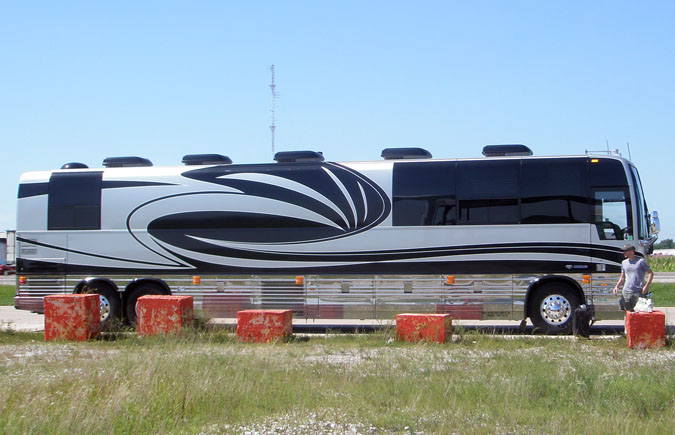
It was about 10 AM on Saturday morning when I crawled out of my bunk to peek out the front lounge window of our tour bus. All week long the weather forecast showed a good chance of 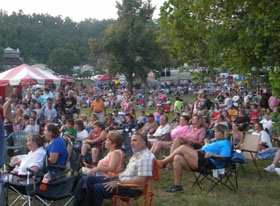 rain, and I thought our outside show was doomed when I viewed the rain coming down on the already soaked Hampton Inn parking lot. A little while later we pulled our bus into the festival grounds along the shore of Lake Barkley in Kuttawa Kentucky. The rain had now stopped, but the grounds were soaked. The night before had been a late one, as frat parties usually are, and most of the band had not gone to sleep until around four or five. So the 11:00 AM load in felt a bit sluggish, especially as it seemed we had dragged the hot humid air we had felt in Alabama with us.
rain, and I thought our outside show was doomed when I viewed the rain coming down on the already soaked Hampton Inn parking lot. A little while later we pulled our bus into the festival grounds along the shore of Lake Barkley in Kuttawa Kentucky. The rain had now stopped, but the grounds were soaked. The night before had been a late one, as frat parties usually are, and most of the band had not gone to sleep until around four or five. So the 11:00 AM load in felt a bit sluggish, especially as it seemed we had dragged the hot humid air we had felt in Alabama with us.
Fortunately, it never rained again and the sun came out which helped to dry the wet field. We set up, sound checked, and then returned to the hotel for some brief downtime and showers. Upon our arrival back to the bus at dinner time, the guys were excited to see several Styrofoam containers of various and assorted BBQ – brisket, pulled pork, ribs – heck, who needs sides with such a varied selection of pork products! A little while later I accompanied Rhett to the meet and greet, which actually wound up being more of an eat and greet, as the banquet room in which it was held boasted a table of food for the guests.
Back to the bus, and we were ready for the show. Our performance began at 7:00 PM and by the time we were three songs in, the crowd had swelled to about 3000, as the music drew in the rest of the festival goers from other areas within the grounds. The crowd was quite vocal, singing along and cheering loudly after 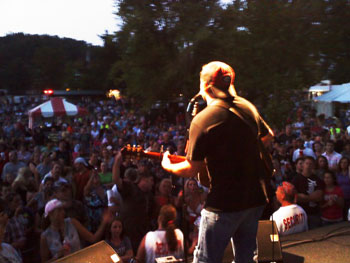 every song. Rhett’s show now contains several hunting songs from his upcoming Warner Brothers release, ‘Bone Collector’ and judging by the response to these numbers, it’s safe to assume that there are a lot of hunters in Kentucky. The show also featured a couple more of Rhett’s recent chart busters ‘It’s All about Tonight’ recorded by Blake Shelton and currently sitting at the number one spot on Billboard, and the funky New Orleans style ‘All over Me’ recorded by Josh Turner and also sitting high on the charts. The show ended with one of our usual encore numbers, Tom Petty’s ‘Last Chance for Mary Jane’ which Rhett introduced with a brief story about his experience seeing Tom Petty in concert earlier in the week.
every song. Rhett’s show now contains several hunting songs from his upcoming Warner Brothers release, ‘Bone Collector’ and judging by the response to these numbers, it’s safe to assume that there are a lot of hunters in Kentucky. The show also featured a couple more of Rhett’s recent chart busters ‘It’s All about Tonight’ recorded by Blake Shelton and currently sitting at the number one spot on Billboard, and the funky New Orleans style ‘All over Me’ recorded by Josh Turner and also sitting high on the charts. The show ended with one of our usual encore numbers, Tom Petty’s ‘Last Chance for Mary Jane’ which Rhett introduced with a brief story about his experience seeing Tom Petty in concert earlier in the week.
Upon the show’s conclusion, Rhett was escorted via golf cart back to the bus. We loaded out and returned to the bus, everyone more than ready for some more BBQ and a few cold ones. Our weekend of shows now over, it was time to head back to Nashville. Tired but happy, we rode off into the night.
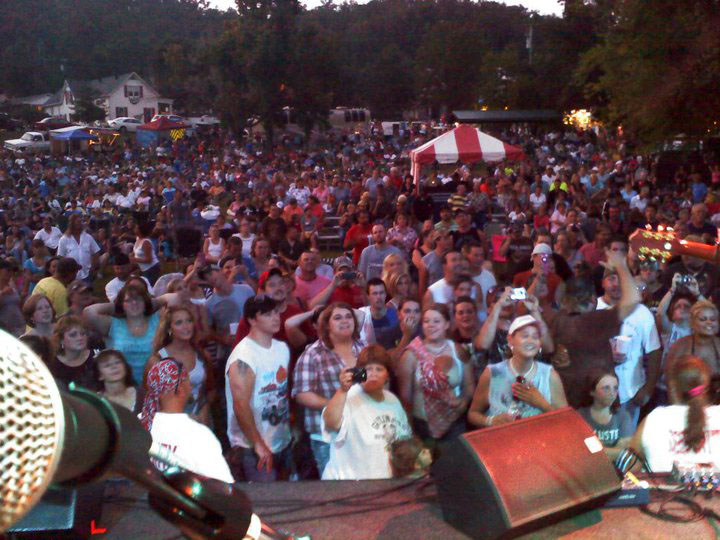
It was about 5:00 PM when we pulled our tour bus up to the newly built Lambda Chi Alpha frat house on this hot and humid summer day in the deep South. The kids greeted us with much 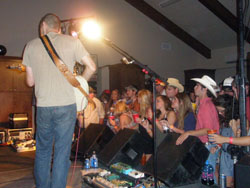 excitement as this party was the first to be held in their brand-new frat house. Upon entering the party room where we would be performing we were a bit surprised at the rooms size – about 30 x 30 with the stage and PA system taking up almost half of the available space. But isn’t this what frat parties are all about? Packing as many drunk college kids as you can into a small intimate setting conducive to chaos and mayhem. It was perfect. All the right ingredients were there.
excitement as this party was the first to be held in their brand-new frat house. Upon entering the party room where we would be performing we were a bit surprised at the rooms size – about 30 x 30 with the stage and PA system taking up almost half of the available space. But isn’t this what frat parties are all about? Packing as many drunk college kids as you can into a small intimate setting conducive to chaos and mayhem. It was perfect. All the right ingredients were there.
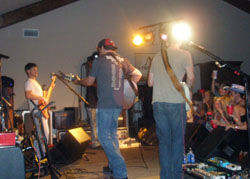 We loaded in our gear, set up, and began our sound check. The Rhett Akins band is as much a rock band as it is a country band, and when we began checking our drums and instruments we were a bit concerned as the volume seemed ungodly in this tiny space. Granted, the room was empty at this point, so we were hopeful that the addition of some bodies would help tame down the volume a bit for the show. This proved to be the case, and by the time we hit the stage for our 11:30 PM start time the kids were raring to go.
We loaded in our gear, set up, and began our sound check. The Rhett Akins band is as much a rock band as it is a country band, and when we began checking our drums and instruments we were a bit concerned as the volume seemed ungodly in this tiny space. Granted, the room was empty at this point, so we were hopeful that the addition of some bodies would help tame down the volume a bit for the show. This proved to be the case, and by the time we hit the stage for our 11:30 PM start time the kids were raring to go.
“Down South” our typical opening number for shows in this part of the country, rendered us off to a roaring start, and the sounds of the band booming out the open doors and windows began drawing in more patrons from the adjoining courtyard. By the end of our second song “I Brake for Brunettes” the room was packed full and the energy was building by the second. A good-looking crowd, as far as frats go, the front row of folks were right up to the edge of the stage, with several attractive girls dancing and singing along in close proximity for some added inspiration. At one point during the show a couple of cuties hopped up on to the stage, dancing and singing with Rhett for a song.
The festivities maintained a high level of excitement right through to the very end of our blistering two hour set, and by the time we walked from the stage we were all dripping with sweat. We packed up our gear, loaded the bus, and said goodbye to the more than appreciative fraternity brothers. Their house had now been officially “broke in” and it was our honor to bust the cherry for them. Thanks Lambda Chi Alpha – we had a great time!
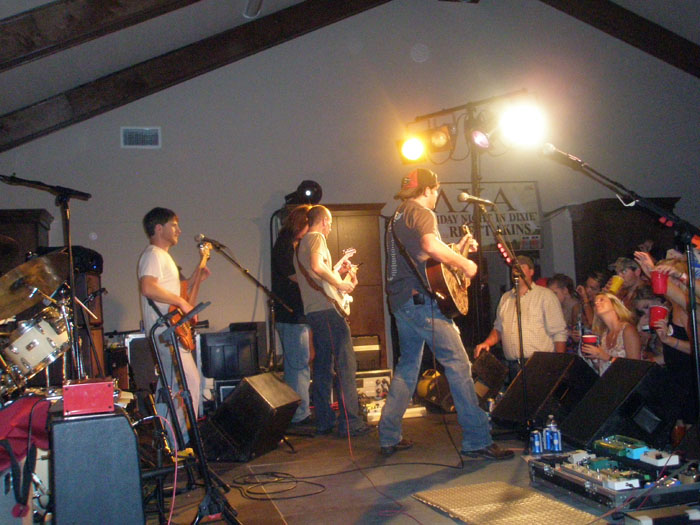
Some people play music for the sheer joy of it, others do it for the money, and many fall somewhere in between. But regardless of music being a career or a hobby, the level of personal enjoyment and satisfaction achieved is largely up to the individual.
I started out as a young boy learning how to play music because it intrigued me. I had made some kind of spiritual connection early on (although I couldn’t have described it in that way at that time), and I felt compelled to play music. I was drawn in to this exciting new world and it was fun for me. Many years later, the thought entered my mind that “Hey, I love playing music, why not make a career out of it?” I gradually began to move in that direction, albeit without a clue as to where I was heading or how I would get there.
In the article ‘Making It’ in the Music Business – An Alternate View for the Independent Musician Graeme Kirk explores this topic in depth. He talks about being in his first band as a teenager and how they had fun in spite of not being very good. At some point into this band expedition he reached a crossroads.
“Like most young bands we reached a stage where reality reared its ugly head. “Get some good equipment”, we were told. “Practice every day…”, “…get a good manager…”, “…learn about the business…”, “..learn to write catchier songs…”
This seemingly good advice proved ultimately demoralizing and eventually his band broke up.
He goes on to write:
“So what?” you may ask. “You just didn’t have the commitment to make it in the music business”. True, but only because we didn’t realize that there can be many different definitions of “making it”. The problem is that most people who were giving us advice don’t realize it either. If we had only been told that there could be more to being in a band than the hard slog, paying your dues, waiting for record companies to notice your path that everyone assumes is the only way to succeed, things could have been much different.
It all comes down to how you define success – how you define “making it”.
The article goes on to talk about the fact that “there is no one path to success because there is no one definition of success.”, a simple, yet poignant thought that speaks volumes about the quandary that faces many musicians.
When you try to make a living as a musician, you base a lot of the decisions regarding your musical activity on financial factors. When paying the bills is directly tied to your gigs and musical activities, sometimes you’ll take gigs you might not otherwise take, basing these decisions on the financial outcome. Sometimes you might join a band or take on work that you don’t enjoy at all, simply because it pays well. On the other hand, some professional musicians are able to enjoy a majority of their musical endeavors, finding at least some shred of enjoyment even in the most difficult situations.
If your career lies elsewhere, your musical life can be of a purer nature. As you are not in it for the money, you are free to play music strictly based on your personal wants and desires, paying no mind to commercial appeal or financial gains. Sometimes the life of a musician who has not made music his career can be more rewarding than that of his professional musician counterpart. Of course this is not always the case either.
So the bottom line is, you have to decide what you want to get out of music, what you want to get out of life, and if having a career in music is needed to accomplish these goals. Maybe you do, but then again maybe you don’t. If you’re thinking about diving in, arming yourself with as much pertinent knowledge as possible is always a good idea. If you’re already well on the path of a career minded musician, keep forging ahead. But whatever you do, always strive to make your musical activites as stress free and fun as possible. Because if you’re not enjoying it, what’s the difference between playing a gig and punching a time clock at a factory job you don’t like.
Enjoying any activity is as much about your perception of that activity as it is anything else. Fun is an attitude, not necessarily a condition, so do your best to maintain a positive outlook and you should be rewarded accordingly. Whether music is your career, your hobby, or something you do for a occasional enjoyment, music is the backdrop of life, and life can be hard. So do your best to make your music count. If you want to have fun with music, make it a conscious decision to do so, because having fun with music is all in your head.
“Decide, commit, succeed!” – Tony Horton
Whether you are an obscure musician trying to get your music heard, a first-time author putting forth a new book, or an independent filmmaker introducing your first film, you all share something in common; a desire to introduce your art to a world that has yet to learn of it. How do you create an awareness of your project? These are tough times and the aforementioned endeavors are not easy ones. The list doesn’t stop there either. Photographers, artists, songwriters, and others are in the same boat.
The new global economy and a variety of other factors has created an extremely competitive dog eat dog world when it comes to business, and this means we all might have to take some alternative approaches to getting the word out. Without the proper publicity and promotion, no one will know about your great project, products or services. Traditional advertising is too expensive for most, and not necessarily that effective anymore. There is no right or wrong approach, but many believe that social media combined with Internet marketing are essential to most startup creative businesses at this point in time. If you’re ready to take the plunge, here’s how you can dive in.
- Build your social pool: Interact regularly on Facebook to slowly build a group of friends, fans, and followers on the Internet. With hundreds of millions of users, it shouldn’t be hard to find a couple hundred that are interested in you. Over time this can grow into thousands. Twittering can be productive as well.
- Start blogging: At this point in time, blogging is a powerful tool and can be used to promote literally any business. Create your own blog and write about your areas of expertise. The information you put forth should not only be directly or indirectly related to your products and services, it should also be useful to your targeted audience.
- Build a website: While a .com domain is optimum and will help to give your business a legitimate “face”, not everyone can afford one initially. There’s nothing wrong with starting out with a free WordPress (or similar) site. This will allow you to begin building your brand. Your blog should be built into this site or linked to it. This website/blog will serve as a central hub to all your Internet activity, with links to Facebook, Twitter, etc.
- Guest Blogging: It can take a while to create heavy traffic on your site. Blogging as a guest on a higher traffic site can help build your readership and drive more traffic to your site.
- Online Discussions: Find message boards with themes that relate to your project and interact with group discussions. Offer advice and perspective where pertinent and provide links to articles on your site.
There is a recent article regarding working in the new social media paradigm that offers some useful tip’s that I highly recommend reading – Top Seven Reasons Why Artists Strongly Resist Social Media by Ariel Hyatt.
The online social interaction approach to publicity is no secret, but it is still a new concept to many. Over time, if done correctly, you will build a “readership” that is genuinely interested in what you have to say, so always strive to provide useful information. By building a large group of readers, or “friends”, fans, and followers, you are connecting with an audience that will potentially come to your shows, buy your book, watch your film, and enjoy your art.
Is this easy to accomplish? No. Does this take time and effort? Absolutely, but then again so does any career. Without the proper promotion, nobody will ever hear about your project. If you think you have something good to offer the world, put it out there. Sometimes the best way to learn how to swim is to just dive in to the pool. You might sink and then again you might not, but you’ll never know if you don’t try.
Are you ready to take the plunge yet?
Where do you get your inspiration from? As a lifelong musician, I’ve now been playing music since the age of eight, about 34 years. But I’ve been listening to music even longer. As a young child, some of my earliest memories are of my dad playing records in our Boxford, MA home. Many an evening or weekend the sounds of the Woodstock era filled the air – Santana, Derek and the Dominoes, John Lee Hooker, even the Woodstock soundtrack. The mysterious black discs spinning around created a sense of wonderment, and even more alluring were the sounds 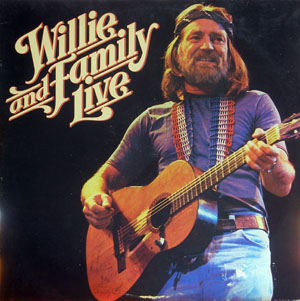 they put forth.
they put forth.
I love music, and I especially love the sound of music that originates from vinyl recordings. There’s really nothing like it. As a teenager growing up in southern New Hampshire in the early 80s, I owned my own stereo and turntable and began buying albums regularly. In fact, I 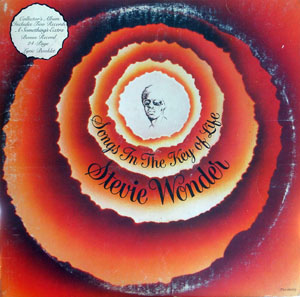 worked at an afterschool job just to support my vinyl habit (okay, maybe a few other habits at that time as well). Every week I would venture to the strawberries record store with my weekly pay burning a hole in my pocket. A short time later I would arrive home to give the new disk a spin, the sounds of Jimi Hendrix, BB King, Led Zeppelin, and others permeating my world daily. It wasn’t just an auditory experience, many records came with amazing artwork, of course you have the great double album which additionally lent itself to a variety of uses. Some albums even came with songbooks or posters.
worked at an afterschool job just to support my vinyl habit (okay, maybe a few other habits at that time as well). Every week I would venture to the strawberries record store with my weekly pay burning a hole in my pocket. A short time later I would arrive home to give the new disk a spin, the sounds of Jimi Hendrix, BB King, Led Zeppelin, and others permeating my world daily. It wasn’t just an auditory experience, many records came with amazing artwork, of course you have the great double album which additionally lent itself to a variety of uses. Some albums even came with songbooks or posters.
Several years into this foray, along came CDs. They kind of looked like mini albums, but with noticeably less artwork. They also had a few other tendencies, for instance the unmusical sound of a digital skip. It took me a while, but I eventually climbed aboard the “CD wagon”, albeit kicking and screaming. It only took me a couple of years to realize the shortcomings of this new “digitally recorded music”, but I eventually did notice. The music just didn’t sound quite as real, warm, or friendly, but this was fast becoming the new medium. It wasn’t long before all my favorite record stores had replaced the bins for records 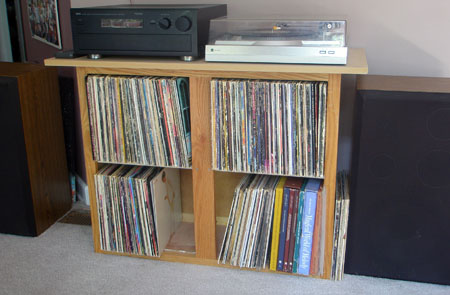 with CDs. Not long after that point in time I stopped listening to my vinyl, as all new music I was purchasing was on CD.
with CDs. Not long after that point in time I stopped listening to my vinyl, as all new music I was purchasing was on CD.
Fast-forward to 2010, and CDs are now being phased out in favor of MP3s, an even harsher sounding representation of music. And of course, the MP3, often living in “the cloud” or an ipod, is completely void of artwork.
Stop, I’ve had enough! Earlier this year I made the realization that I wasn’t listening to music as much as I used to. At first I thought this might have been because I listened to so much music in my earlier years that I might be just “all listened out”. But then I got my turntable repaired, something I had been meaning to do for some time, and slowly, began rediscovering the magical world of vinyl.
I set up the turntable in my living room and began to check out some of my favorite old records. Right away I 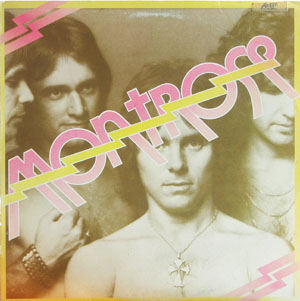 noticed they sounded so good, noticeably better than their harsh digital counterparts my ear had become accustomed to. This rediscovery led me to a few recent trips to a local used record store – let the bargains begin. I can’t believe some of the gems I’ve purchased for just a dollar or two. One in particular was a mint condition copy of “Montrose” Sammy Hagar’s earliest band, and this gem was just 68 cents! Delbert McClinton, James Taylor, Beethoven’s Moonlight Sonata – all for just a dollar apiece?
noticed they sounded so good, noticeably better than their harsh digital counterparts my ear had become accustomed to. This rediscovery led me to a few recent trips to a local used record store – let the bargains begin. I can’t believe some of the gems I’ve purchased for just a dollar or two. One in particular was a mint condition copy of “Montrose” Sammy Hagar’s earliest band, and this gem was just 68 cents! Delbert McClinton, James Taylor, Beethoven’s Moonlight Sonata – all for just a dollar apiece?
Among some other recent scores were a mint condition copy of AC/DC’s Back in Black, Stevie Wonder’s Songs in the Key of Life, and BB King live in London. A couple of weeks ago I found a yard sale with a collection of 4000 records all from the mid-70s or earlier.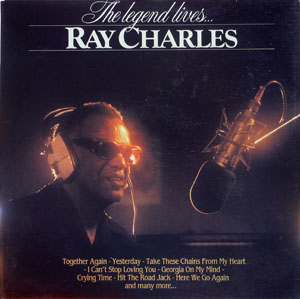 Kelly and I spent about an hour pilfering through about half the collection and walked away with 25 gems for $20.
Kelly and I spent about an hour pilfering through about half the collection and walked away with 25 gems for $20.
I’m hooked, what can I say. Since this recent vinyl resurrection I am listening to more music regularly than I have in years. It really does sound better. Listening to music like this reminds me of why I became so involved with music in the first place – why I became a musician. When I put a record on, it feels like I’m in the room with the band. The drums sound real, the guitars sound right, the bass is tight, and the vocals are deep. I know I can’t listen to these sounds in my car, and beyond the walls of my home the rest of world continues to suffer from the sounds of the sterile digital status quo and all of its shortcomings.
I know a lot of people enjoy digital music, I’m not saying it can’t be done. But if you haven’t ever ever experienced the joys of vinyl, check it out if you ever have the chance. If you’re ever over a friends house and you spot a turntable, request a side. I challenge you to listen to your favorite artist on vinyl and not be able to hear something new in their music.
Well I’ve got to go now, it’s time to give my new Ray Charles record a spin.
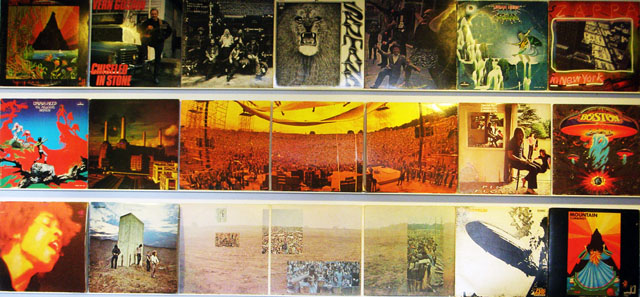
For those of you who following my progress on this project, here is a status report.
Writing a book is quite a process, a process I knew nothing about when I embarked on this journey nearly 18 months ago, but one that I am fast learning about. A couple of months ago I purchased the book “Dan Poynter’s Self-Publishing Manual” and it has turned out to be a godsend. I learned that in this day and age, a niche book, such as mine, stands a greater chance of success with self-publishing as opposed to traditional publishing routes. That recent discovery has prompted Kelly and I to launch our own publishing company, Just Ducky Publishing.
I’ve also learned that editing and interior book designing can be quite expensive, so we are taking on these tasks as well. Kelly is an outstanding Web designer and has extensive abilities with computer-based graphic design. We already own a program commonly used for book design – Adobe’s Indesign, so now it just comes down to the learning curve regarding that software.
I recently conducted an in-depth interview about songwriting with one of the best in the business, my friend (and boss) Rhett Akins. This eye-opener will be included in the book.
One of the things recommended in the self-pub manual is peer reviews of chapters and content, as this not only serves as a fact checking mission, it also helps promote the book. For this I am enlisting the help of a wide range of experts and professionals. Included in this list so far is; Rich Eckhardt – lead guitarist for Toby Keith, Dan Kimpel – instructor at the Musicians Institute in California, James Wood – BMI, Kevin Neal – Buddy Lee Booking Agency, Serona Selton – University of Miami, and Brenda Coladay – The Grand Ole’ Opry, amongst many others.
This process is a bit time consuming but well worth it. The feedback I have received so far has allowed me to further tweak some of my writings, and I am grateful for the participation of these highly respected peers.
Not unlike everything in business and life, completing this book is taking longer than I initially projected. And with that I am now aiming to go to print in January. As much as I would like to have this completed for my original planned release date of September, at this point I feel it is imperative to get it right and not be hasty with a premature release.
So while I continue marching forward with this project I will continue to post articles regularly about music and music business topics on the Survival Guide blog. I recently added the much requested “Nashville 100” song list to the website and will try to add some more tidbits in the coming months as well.
Thanks again for your continued support and readership.
Peace
Eric
I read an interesting message board post the other day in which this question was raised. The post was written by a musician who had just opened for Grand Funk Railroad. His account tells of an exciting day and show for his local band (and the 4000+ in attendance). They were treated well by the event staff, had their own backstage area, and performed to a packed house through state-of-the-art production. They were even able to bring their families to share in this experience.
The only negative was his perception of the day’s headliner. While giving GFR credit for having exceptional musicianship and putting on a “killer show”, he went on to say that they were “tremendous jerks”. This was apparently based on the fact that the band was nowhere to be found throughout the day despite an interest from some fans for autographs, and a desire for the musicians in the opening band to meet them. The fact that they were not hanging around backstage all day was interpreted to mean “GFR wanted nothing to do with the unwashed masses”. He went on to comment that there was a cooler backstage marked “Grand Funk Only” and that he opened it up only to find that “there was nothing in there but fruit juice anyway.”
Lastly he mentioned that he met a man with his son in the parking lot and that the young boy wanted his sticks signed by Grand Funk’s drummer. So during Grand Funk’s set this local musician takes the young boys sticks to a security guard requesting the autograph. Apparently the security guard declined, prompting the comment in this fellow’s post “How do you behave like that?”
This brings up some common false perceptions that many people have about national level touring acts and high profile artists.
First of all, touring is hard work. Despite what might be portrayed on some VH1 episode of behind the music, the life of a touring artist or band is not all that glamorous. When I went to Grand Funk’s website I noticed this particular show was a one-off, with no dates preceding or following it by a week. Likely, this appearance in Webster MA was a fly date for the band and crew. For a band like Grand Funk performing a show of this nature, they probably flew in the day of the show. They might have gotten up as early as 5 or 6 AM to drive to an airport, spent 8 to 10 hours trekking suitcases and guitars through airports, onto planes, through more airports and planes, eventually winding on a van ride to a hotel somewhere near the venue. They might have appeared at the venue for a mid-afternoon sound check and then returned to the hotel for dinner and a shower before the show. By the time they hit the stage for their performance at eight or nine at night they might have been up for 12 to 14 hours. Regardless of their daily activities and methods of transportation, it sounded like the concert was their primary focus as they supposedly put on a “killer show”.
According to Grand Funk’s website, one run of shows earlier in the summer brought them from back-to-back concerts in California, to Michigan, back to California, to Montana, Oregon, and then Washington, all in less than 10 days. Judging by the routing, these were undoubtedly fly dates with some long van rides likely in the mix. Just one fly date can be exhausting, let alone eight in a row. Other touring scenarios put acts like Grand Funk and others on a tour bus as a means of travel. While a half million dollar Prevost XLII might seem plush upon first examination, it is still, just a bus. And this means they are sleeping in a bunk about the size of a coffin while rolling down the highway at 75 mph. Sometimes the location of concert dates requires as much as 500 to 1000 miles of bus travel between shows (8 to 16 hours of driving time). I don’t care how nice the bus is, traveling thousands of miles in a week is exhausting.
This is all part of the job of a touring band, artist, or musician, and most take it in stride. While the musical performance might be the high point of the day, the long hours of travel, isolation from family and friends, and constantly being around other people causes many performers to cherish the occasional privacy they may have on the road.
So just because you didn’t “see them” doesn’t mean they weren’t there at some point before the show. Or maybe travel arrangements didn’t even get them on site until minutes before the show. Maybe they were on site well before showtime and hanging in some dressing room, tired from traveling and saving their strength to put on a “killer show”. Maybe the cooler was labeled “Grand Funk Only” because they only drink fruit juice, and this was their only beverage for the night. Many artists are required by event buyers to put on a “Meet and Greet” in which case they might have to meet, be photographed with, and sign autographs with as many as 50 people or more, likely all of whom are complete strangers. These Meet and Greets are not typically optional, and if an artist is tired or even ill they must put on a happy face and go out to shake hands with this roomful of strangers.
It would be no different than if you were standing in line at the bank on your lunch break and a complete stranger started talking to you and demanding your undivided attention. You might talk to him because you’re a nice person, but you might have actually preferred to be left alone, to enjoy your own privacy.
High profile bands, musicians, and artists are just people. Touring on a national level is just a job for these folks, and a hard job at that. All the public sees at a concert is the finished product, a concert hall prepped for hours before the doors are even opened. The version of their favorite band or artist they see is the “showbiz” face all artists are required to wear. But the reality is that by the time that performer hits the stage they have likely had a hectic and busy day. They will likely leave that concert venue after the show only to do it all over again the next day. On the one day out of the year that you saw them in concert, they might be having a great day, or, they might be tired, sick, or having a not so great day. They might be missing their kids, experiencing marital problems, or even going through financial hardships. They are just people that happened to choose music as a profession – real people that experience real human emotions, have lives away from their job, and go through all of the same kinds of problems that life throws at the rest of us. The only difference is their profession doesn’t allow for sick days.
So, what do bands and artists owe the public and their fans? The answer is quite simple – a great show. Nothing less, and nothing more.
